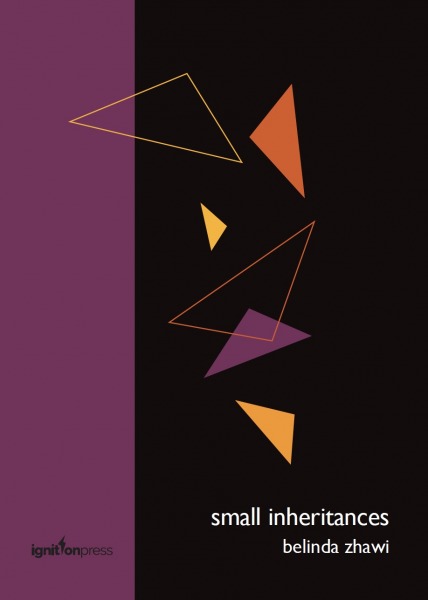Belinda Zhawi’s debut pamphlet, Small Inheritances (Ignition), maps out the spaces where the speaker has lived, tracing a way back through the ‘dregs of south east london’ to a childhood in Zimbabwe.
The first section, set in Thamesmead and Peckham and titled ‘small inconveniences’, re-maps the streets and estates to reveal the struggles and longings of their inhabitants, denouncing the harshness of the environment:
London’s a city of ghosts so we hide
in its shadows; overpriced acid tabs & pills.
The pronouns we/us are in italics, which reflects the experience of othering and marginalisation, as well as decentring the viewpoint of the reader to form an opposition that may appear alienating (‘we… say fuck you too’).
Zhawi’s sometimes brutal portrayal of urban reality also contains a fragile beauty rendered by visual, tactile imagery and broken lines, as when ‘We beg / the night not / to end, plead / with it to spend / its morning cloaked / in darkness’. And an array of drugs – weed, acid, ecstasy – offers solace and reprieve: ‘Our skins / stay open, each / touch from the bass / sending us / in upward spirals / of bright starlight’.
‘holstein way (reclamation song)’ and ‘evenlode house (self care)’ suggest a shift towards the possibility of healing, giving more importance to prayer and the body and memory and ritual, at the start of a journey that prompts the speaker to leave her mother’s home. In ‘bantuland (dear whinchat)’ she starts remembering what she has lost to diaspora: ‘the sound of a metal pail’; ‘the feel of early morning’; ‘my grandmother’s face’. The repetition of the phrase ‘I’ve forgotten’ followed by ‘I feel like home has forgotten me’ makes regret palpable, conveying a loss of intimacy with the homeland. The recurrence of the words ‘so I can stop forgetting’ in the final lines reads like an incantation.
The three poems of the second section, ‘small infidelities’, explore a difficult romantic relationship in the speaker’s adult life and the effects of racialisation on embodiment. Tracing her lover’s back, the speaker’s hands can feel ‘the deep purple of the bruises left’ by police officers. In these poems, the body itself becomes a map full of trajectories: ‘the three tones of your skin / patched like an atlas of half a continent’, legible as a poem by those who ‘want their bodies split / into fourteen lines till they transform / into non-leaking sonnets of white powder.’
The last section, ‘small inheritances’, travels to Zimbabwe and creates bridges between a range of locales by linking community life, ritual and memory. The first poem describes people gathered to perform an ‘incantation for rain’. Shona words and phrases are often embedded into the lines, as in the bilingual poem ‘chitsa growth point (maternal stock)’, which recalls women in the family and the harsh conditions of their lives. By stating ‘Ini ndini Ratidzo, first daughter,’ the speaker claims her place within this genealogy.
In one of the two prose poetry pieces included in this section, the smell of marijuana in Dartford takes the speaker by surprise, reminding her of her deceased grandfather: ‘The night he died, you had not seen him for ten years’ and yet now ‘you’d found a new friend in an old smell that / hung over the South East London night’. Here, the poem is able to recall people and places from the speaker’s past and reintegrate them into her new environment.
By the last poem, the child who ‘Inherited her father’s sins, a life of chasing / East to West when home is really South’, has traced her origins all the way back to the moment of birth, which, although it refuses to bring resolution, shows that suffering did not begin with the speaker herself but has been handed from one generation to the next, women often perpetuating, and being victims of, gendered violence, rupture replaying itself. The speaker relates the complexity of family ties, saying she
could never tell from those red welts
if it was that you looked like your father
or because birthing you almost killed her.
The collection does not yield a neat conclusion; instead, healing is rendered as an active endeavour that is unlikely to be fully achieved. In this sense, the poems hold space for connections that simultaneously collect memories from the past, narrate present perceptions, and enable the speaker to endure. Likewise, there are no clear then/now or here/there divisions but complex relationships between past and present across lived spaces affected by colonisation and racism.
The reader progressively sheds the impression of alienation to become more intimate with the thoughts and perceptions conveyed by Zhawi, although they may be unfamiliar. Through this pamphlet, another south eastern London emerges, one in which unpredictable trajectories translate into different forms of embodiment and bring new depth and humanity to what is often represented as an oppressive landscape.
You can find out more about Small Inheritances from Ignition.
If you’d like to review for us or submit your publication for review, please email Ali Lewis on [email protected] or Will Barrett on [email protected].

Add your Reply
You must be logged in to post a comment.